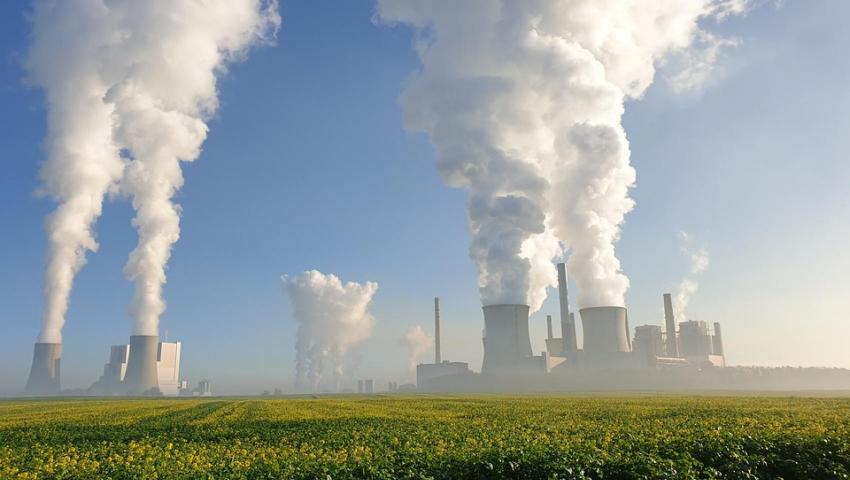Bulgaria expects BGN 2.4 billion in revenue from the sale of carbon quotas for 2023

Bulgaria has 8 million quotas for sale per year and together with the quotas from the derogation they become over 13 million in just one year
Source: PIxabay
Raya Lecheva
Bulgaria expects EUR 1.2 billion or BGN 2.4 billion in revenue from the sale of quotas for greenhouse gas emissions from installations for 2023, 3eNews has learned. The data is a conservative estimate based on Sandbag analysis and futures prices on the ICE exchange until December 2025. This includes income from quotas under Art. 10c through an auction, taking an average price per ton of carbon dioxide of 90 euros per ton.
However, the estimated prices are unstable on an annual basis due to the great dynamics of the market of energy prices, the current geopolitical situation and the ongoing negotiations in the Council on the proposals of the EC for new legislative acts and amendments to existing ones from the package "Prepared for the purpose of 55% ".
For 2023 and the period 01.01.2023-30.06.2023, the auction quantities for Bulgaria are generally not included annually, 5,159,984 quotas are allocated to the country under the derogation according to Art. 10c of the European Emissions Trading Scheme Directive. They would have to be distributed according to certain rules to the electricity producers, if this derogation were to work for Bulgaria.
These quotas (5,159,984 each until 2030) can only be used either for allocation to electricity producers, if the derogation is approved by the EC, or auctioned. In order to be included in the tender quantities for Bulgaria for the respective year, it is necessary to officially declare this with a letter from the Minister of Energy to DG Climate of the European Commission.
It is expected that 4 million quotas will be traded by June, and 8 million tons by the end of the year, and revenues are calculated at estimated prices of 90 euros per ton. By June, half of the amount of 592 million euros or over 1 billion leva will be traded, according to preliminary forecasts of the Ministry of Environment and Water.
The quotas under Art. 10c of Directive 2003/87/EC are another 2.5 million by June and 5.1 million by the end of the year. The total amount of quotas if the quotas under Art. 10c become 6.5 million by June and more than 13.1 million by the end of the year.
The expected revenue from the sale of quotas from the installations is BGN 1.4 billion by the end of the year
The expected revenues from the sale of quotas from the installations alone are EUR 360 million or BGN 704 million by June and EUR 720 million or BGN 1.4 billion by the end of the year. But with the addition of the quotas from the derogation, the planned revenues increase to BGN 2.4 billion.
Revenues from emissions quotas in Bulgaria are an important tool for stimulating low-carbon development. 100% (until June 2016 – 77%) of the revenues from the auction sale of all emission quotas allocated to Bulgaria for greenhouse gas installations are contributed to the Energy System Security Fund, which are used to reduce the price for obligations to society.
In 2022, installations that will have to buy allowances look with anxiety and tension to the EU carbon market. But it turns out that Bulgaria will continue to earn record amounts from the fact that business buys additional emission quotas against air pollution.
A reason for the higher prices lies both in the reforms made so far in the EU Emissions Trading Scheme, but also in upcoming ones. New sectors are slated to join the EU emissions trading system, with marine emissions to be included from 2023 and aviation from 2024, creating additional demand for allowances. Buildings and transport are to be included, with almost all sectors of the economy having to pay a carbon tax or fee.
Bulgaria will continue to have record revenues, the question is how it will use them
The European Climate Law, which came into effect in July 2021, increases the EU's climate target to a 55% reduction in emissions by 2030 compared to 1990 levels, from 40%.
Although there is still a significant surplus of allowances in circulation, the expected tightening of the market has encouraged speculators to enter this market. Analysts at THEMA Consulting even commented in 2021 that "speculative demand by investors has structurally raised the price of CO2." An investigation by the European Securities and Markets Authority found no evidence of market manipulation, but speculators betting on rising carbon prices helped drive them up.
In addition, unexpectedly strong demand for energy in 2021 was met with supply constraints, particularly of natural gas, leading to a sharp rise in prices in the fall. Power producers have responded by increasing production from carbon-intensive coal-fired power, by causing the demand for additional carbon allowances.
Emissions revenues are to finance the new Social Climate Fund
After 2026, it is expected that the income from quotas will enter a special Social Climate Fund, which will generate income not only from the purchase of quotas from the installations in Bulgaria, but also from other EU countries. The resource in it for Bulgaria is expected to be 2.8 billion euros or about 5 billion leva. Energy experts suggest that part of these funds, at least 10%, should go to support energy-poor households in Bulgaria, which are actually 1/3 of the country's population.
